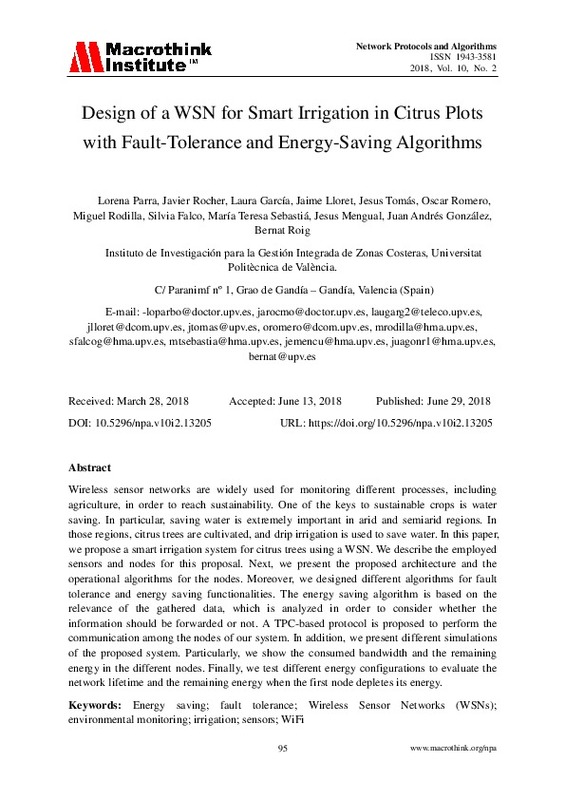JavaScript is disabled for your browser. Some features of this site may not work without it.
Buscar en RiuNet
Listar
Mi cuenta
Estadísticas
Ayuda RiuNet
Admin. UPV
Design of a WSN for smart irrigation in citrus plots with fault-tolerance and energy-saving algorithms
Mostrar el registro completo del ítem
Parra-Boronat, L.; Rocher-Morant, J.; García-García, L.; Lloret, J.; Tomás Gironés, J.; Romero Martínez, JO.; Rodilla, M.... (2018). Design of a WSN for smart irrigation in citrus plots with fault-tolerance and energy-saving algorithms. Network Protocols and Algorithms. 10(2):95-115. https://doi.org/10.5296/npa.v10i2.13205
Por favor, use este identificador para citar o enlazar este ítem: http://hdl.handle.net/10251/117073
Ficheros en el ítem
Metadatos del ítem
| Título: | Design of a WSN for smart irrigation in citrus plots with fault-tolerance and energy-saving algorithms | |
| Autor: | ||
| Entidad UPV: |
|
|
| Fecha difusión: |
|
|
| Resumen: |
[EN] Wireless sensor networks are widely used for monitoring different processes, including
agriculture, in order to reach sustainability. One of the keys to sustainable crops is water
saving. In particular, saving water ...[+]
|
|
| Palabras clave: |
|
|
| Derechos de uso: | Reconocimiento (by) | |
| Fuente: |
|
|
| DOI: |
|
|
| Editorial: |
|
|
| Versión del editor: | https://doi.org/10.5296/npa.v10i2.13205 | |
| Código del Proyecto: |
|
|
| Agradecimientos: |
This work has been partially supported by the “Conselleria d' Educació, Investigació, Cultura i Esport” through the “Subvenciones para la contratación de personal investigator de carácter predoctoral (Convocatoria 2017)” ...[+]
|
|
| Tipo: |
|









